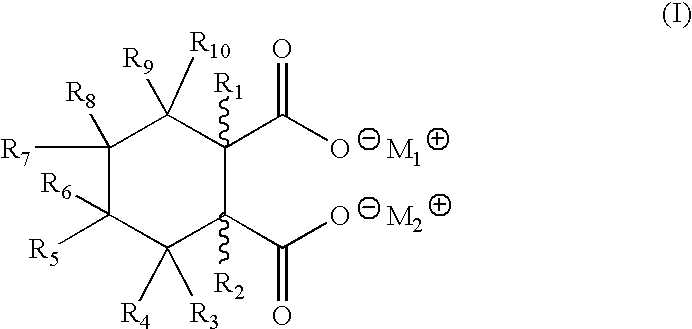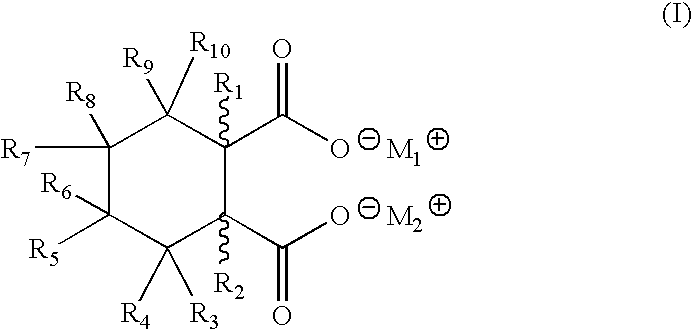Disodium hexahydrophthalate salt compositions and nucleated polymers comprising such compositions
- Summary
- Abstract
- Description
- Claims
- Application Information
AI Technical Summary
Benefits of technology
Problems solved by technology
Method used
Image
Examples
example 1
[0024] Cis-Disodium HHPA:
[0025] To a 250-mL Erlenmeyer flask with a magnetic stirrer was added water (100 mL), sodium hydroxide (10.38 g, 260 mmol), and cis-hexahydrophthalic anhydride (20 g, 130 mmol). The reaction mixture was stirred at room temperature until homogeneous, at which time a slight exotherm was observed. After stirring for three hours, the solution was poured into acetone (2 L), and the white solid collected via suction filtration. Drying in a vacuum oven at 110.degree. C. gave 20.9 g (74%) as a white powder, mp>350.degree. C. IR and NMR analyis were consistent with that of the expected product.
example 2
[0026] trans-Disodium HHPA:
[0027] To a 1 -L Erlenmeyer flask with a magnetic stirrer was added acetone (500 mL) and trans-1,2-cyclohexanedicarboxylic acid 17.2 g (100 mmol) with stirring at room temperature. To this slurry was added a solution of sodium hydroxide (18 g, 450 mmol) in water (50 mL), at which time a thick white precipitate formed. After stirring a further 2 hours, the white solid was collected via suction filtration, washed with acetone (200 mL) and water (20 mL), and dried in a vacuum oven at 100.degree. C. to give a white powder (dry weight=17.3 g, 80% yield), mp>400.degree. C. IR and NMR analysis were consistent with that of the expected product.
[0028] Production of Inventive Compositions and Nucleated Polyolefins with Such Compositions
[0029] Thermoplastic compositions (plaques) were produced comprising the compounds from the EXAMPLES combined with certain acid scavenger compounds. Such mixtures were formulated through the simple introduction of such compounds as in...
PUM
| Property | Measurement | Unit |
|---|---|---|
| Electric charge | aaaaa | aaaaa |
| Fraction | aaaaa | aaaaa |
| Fraction | aaaaa | aaaaa |
Abstract
Description
Claims
Application Information
 Login to View More
Login to View More - R&D
- Intellectual Property
- Life Sciences
- Materials
- Tech Scout
- Unparalleled Data Quality
- Higher Quality Content
- 60% Fewer Hallucinations
Browse by: Latest US Patents, China's latest patents, Technical Efficacy Thesaurus, Application Domain, Technology Topic, Popular Technical Reports.
© 2025 PatSnap. All rights reserved.Legal|Privacy policy|Modern Slavery Act Transparency Statement|Sitemap|About US| Contact US: help@patsnap.com


